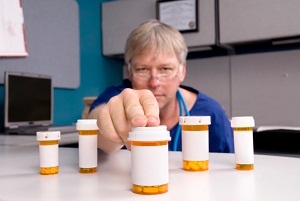 The new Diagnostic and Statistical Manual of Mental Disorders (DSM-V) will be out next spring with more ways to pin labels of “disorder,” “dysfunction,” and “disease” on people who come to therapists and psychiatrists for help with emotional issues.
The new Diagnostic and Statistical Manual of Mental Disorders (DSM-V) will be out next spring with more ways to pin labels of “disorder,” “dysfunction,” and “disease” on people who come to therapists and psychiatrists for help with emotional issues.
Why should you care?
Usually (although not always) when you go to a therapist or medical doctor for help with personal, marital, family, or other emotional issues, you are given a diagnosis. Insurance companies use this diagnosis to decide how much money to spend on your care. The more serious the diagnosis, the better the reimbursement the therapist will get—up to a point.
If a medication is often used to treat a serious diagnosis, the pharmacological approach will be taken. Using prescription medications to treat mental disorders is cheaper for insurance companies.
This means you are getting a label. Not only that, it’s a label of mental disorder. Should you be getting one? If you have a difficulty finding your way through life’s maze, does that really mean something is wrong with you? I don’t think so. Unfortunately, with each new publication of the DSM, the number of “disorders” increases.
On the surface, the advent of the updated manual would seem like a scientific breakthrough. It would appear to the unsuspecting person that science has been able to pin down more problems and thus will be able to help us deal better with them.
The opposite is the case.
Consider this: DSM-I, published in 1952, had a category called “sexual deviation” that included homosexuality. This caused an uproar among people who did not consider homosexuality a deviation.
Although there was much debate, the 1968 DSM-II included homosexuality once again as a deviation. Over time, activists gained a voice, and the 1973 version of DSM-II replaced homosexuality as a disorder with “sexual orientation disturbance,” which covered only people who were unhappy with their orientation.
The American Journal of Psychiatry admitted that inclusion or exclusion was simply a value judgment.1 By DSM-IV, homosexuality came out of the manual altogether. Activists were happy; traditional psychoanalysts and others were not.
This manual is more about values than science. That should matter to you because it means you are labeled and medicated on the basis of values, not science—and that becomes clearer as you kick the tires.
For example, DSM-II called problems “diseases,” while this changed in DSM-III to “disorders.” Why? Robert Spitzer, a major participant in the creation of DSM-III, explained2: “In both manuals, there is the assumption that the term ‘disorder’ includes conditions with varying levels of understanding of etiology or pathophysiologic process and that in only a small number of mental disorders do we possess the knowledge for the condition to be regarded as a ‘disease.’ ”
In plain English, he’s saying that it’s OK to label someone as having a “disorder” when we don’t really know how this problem came about or what it will do to the person in the future, let alone what do about it. This label is all right because we are not going so far as to call it a “disease.”
DSM-III added “many new psychiatric diagnoses” based only on “clinical utility, acceptability to clinicians of various theoretical persuasions, and an empirical database to propose explicit diagnostic criteria that could be tested for reliability and validity”3—not hard science.
In other words, being useful and acceptable to a variety of therapists and having the ability to be tested someday for reliability and validity were the criteria for choosing to put new diagnostic labels into the updated manual. They admit that “systematic field trials were not available when the DSM-III was published.”
All this seems to back up Thomas Szasz, who stated: “The claim that ‘mental illnesses are diagnosable disorders of the brain’ is not based on scientific research; it is a lie, an error.”4
When the 1994 version, DSM-IV, came out, it was hoped that many of these problems would be corrected. They were not.
In 2002, researchers objected to “the lack of strong empirical foundations in the DSM” and added that the drafters of all versions were primarily “white male psychiatrists who embedded the documents with their biases.”5
Fuzzy science prevailed. The DSM was used to determine that someone was depressed, and then they said the DSM must be accurate because that person fits the description of depression!6
Even if the DSM were created with great scientific rigor, research shows that therapists would not follow it properly. Since therapy is a conglomeration of many theories and approaches, each therapist will view the problems of the person in front of him or her through a different lens; some symptoms will seem important to one therapist and not to another. Therapists will then look for information that confirms their theories. This is normal human behavior and is called the confirmation bias.7 The greater the ambiguity in the diagnostic protocol, the easier for confirmation bias to creep in.
Now it’s 2012, the DSM-V will soon be released, and surely it will clean up all these problems, right? Wrong.
Here is what Dr. Allen Frances, chair of the DSM-IV task force, said about the upcoming DSM-V: “This is the saddest moment in my 45-year career of studying, practicing, and teaching psychiatry. The Board of Trustees of the American Psychiatric Association has given its final approval to a deeply flawed DSM-V containing many changes that seem clearly unsafe and scientifically unsound.”8
So how does all this affect you? Quoting Dr. Frances: “New diagnoses in psychiatry are more dangerous than new drugs because they influence whether or not millions of people are placed on drugs—often by primary care doctors after brief visits.”9
This is how it will affect your children: Disruptive mood dysregulation disorder, a DSM-V addition, is another name for children with temper tantrums. If parents feel helpless to control their child, the solution is not to give the parent tools to take control, but to pin a diagnostic label on the child that will follow him or her for life—along with a prescription for a mind-altering drug.
Mind you, this diagnosis may be wrong and the drugs may do damage, but that doesn’t matter.
What’s wrong with this? Why isn’t that a good solution?
There is no research whatsoever that proves that a 2-year-old child has a diagnosable “disorder” that cannot be fixed with appropriate handling. In order to prove he or she has such an issue, the child would first need to be treated appropriately by the parents using well-tried, successful parenting techniques. Then, if that fails, he or she may have a diagnosable “disorder.” But this has never been done.
Assuming that, for argument’s sake, there really is such a 2-year-old who requires a heavy-duty diagnosis, does that mean the treatment of choice must be medication? Please see my blog for detailed articles reporting research that shows clearly that medication plays second fiddle to therapy.
Finally, assuming that a small child has no other option but medication (a very hypothetical case, indeed), how will a lifetime of medication affect that child?
The question of personal identity has been huge for people on medication.10 As Katherine Sharpe, author of Coming of Age on Zoloft: How Antidepressants Cheered Us Up, Let Us Down, and Changed Who We Are, says in a Wall Street Journal interview:
“Antidepressants and other psychiatric medications went mainstream in the 1990s and 2000s, and my generation became the first to use these drugs in significant numbers as adolescents and young adults …
“According to the U.S. Centers for Disease Control and Prevention, 62% of Americans aged 12 and over who take antidepressants have done so for two years or longer; 14% have taken them for 10 years or longer. … Lacking a reliable conception of what it is to feel ‘like themselves,’ young people have no way to gauge the effects of the drugs on their developing personalities. [As one person said], ‘I think Prozac has helped me a lot, but I wonder, if I’d never gotten antidepressants, who would I be?’ ”11
So why should you care about the DSM-V?
- Because you and your children should not receive labels that imply that you are dysfunctional, labels that will follow you for life.
- Because if you’re going to get such a label, it had better be accurate, not something that sounds scientific but is just a matter of someone’s opinion.
- Because medication leaves you wondering who you really are, or would be, without it.
- Because there is help for you that is generally superior to medication.
- Because medication is disempowering; if other ways are better, they should be tried first. As the Golden Rule of all codes of ethics states: First, do no harm.
References:
- The American Journal of Psychiatry, 1981, 138(2). http://ajp.psychiatryonline.org/article.aspx?articleid=158812
- Spitzer, R. L. Values and Assumptions in the Development of DSM-III and DSM-III-R: An Insider’s Perspective and a Belated Response to Sadler, Hulgus, and Agich’s “On Values in Recent American Psychiatric Classification.” The Journal Of Nervous And Mental Disease, 2001, 189(6), 351–359. http://hss.caltech.edu/~steve/dsm.pdf
- Zucker, K. J. and Spitzer, R. L. Was the Gender Identity Disorder of Childhood Diagnosis Introduced into DSM-III as a Backdoor Maneuver to Replace Homosexuality? A Historical Note. Journal of Sexual and Marital Therapy, 2005, 31(1), 31-42. http://www.ncbi.nlm.nih.gov/pubmed/15841704
- Szasz, T. The Myth of Mental Illness, 1960, reprinted in 2011. http://www.amazon.com/Myth-Mental-Illness-Foundations-personal/dp/0061771228/ref=sr_1_2?s=books&ie=UTF8&qid=1344202530&sr=1-2&keywords=thomas+szasz+the+myth+of+mental+illness#reader_B004V54ENO
- Beutler, L and Malik, M. Rethinking the DSM: A Psychological Perspective. Washington, DC: American Psychological Association, 2002, p. 6. http://psycnet.apa.org/psycinfo/2002-02349-000
- Beutler, L and Malik, M. Rethinking the DSM: A Psychological Perspective. Washington, DC: American Psychological Association, 2002, p. 8.
- Nickerson, R. S. Confirmation Bias: A Ubiquitous Phenomenon in Many Guises. Review of General Psychology, 1998, 2(2), 175-220. http://psy2.ucsd.edu/~mckenzie/nickersonConfirmationBias.pdf
- Frances, A. DSM-5 Is a Guide Not a Bible: Simply Ignore Its Ten Worst Changes. Huff Post, Dec 3, 2012. http://www.huffingtonpost.com/allen-frances/dsm-5_b_2227626.html
- Frances, A. DSM-5 Is a Guide Not a Bible: Simply Ignore Its Ten Worst Changes. Huff Post, Dec 3, 2012. http://www.huffingtonpost.com/allen-frances/dsm-5_b_2227626.html
- Karp, D. Is It Me or My Meds? Living with Antidepressants. Harvard University Press, 2006. http://www.amazon.com/Me-My-Meds-Living-Antidepressants/dp/0674021827/.
- Sharpe, K. The Medication Generaton. The Wall Street Journal, June 29, 2012. “http://online.wsj.com/article/SB10001424052702303649504577493112618709108.html
© Copyright 2012 GoodTherapy.org. All rights reserved. Permission to publish granted by Deb Schwarz Hirschhorn, PhD, Relationships & Marriage Topic Expert Contributor
The preceding article was solely written by the author named above. Any views and opinions expressed are not necessarily shared by GoodTherapy.org. Questions or concerns about the preceding article can be directed to the author or posted as a comment below.

 Recognizing the Good Can Help End Endless Fights
Recognizing the Good Can Help End Endless Fights Autism Spectrum and the DSM-V: More Questions Than Answers
Autism Spectrum and the DSM-V: More Questions Than Answers The Human Disorder: DSM-V Fraught with Danger
The Human Disorder: DSM-V Fraught with Danger